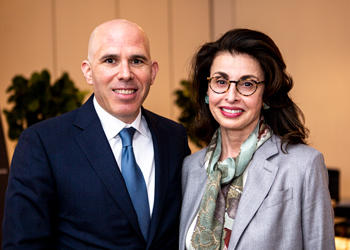Even if you control some of the city’s preeminent office stock, as Scott Rechler does, beware: If you continue to operate as if it’s the 1990s, your days are numbered.
“The world has become much more disrupted by technology,” the RXR Realty boss told CBRE’s Tri-State CEO Mary Ann Tighe at The Real Deal’s showcase Wednesday. “Our industry has been the last to adapt.”

RXR Realty’s Scott Rechler and CBRE’s MaryAnn Tighe (Credit: Emily Assiran)
Rechler recently struck a revenue-sharing deal with WeWork at his 75 Rockefeller Plaza tower, the first-such agreement the co-working giant has signed in New York. The developer also recently brought on Airbnb to manage 200 hotel-style units in the building. Together, the moves should change the culture of the tower to a 24-7 environment, Rechler said, and he hopes the property will serve as a “prototype” for what the market should become.
“Culture trumps everything right now,” Tighe noted. “Think of the Vessel [sculpture at Hudson Yards]: $250 million so that people could have Instagrammable moments.”
Tighe, the city’s longtime top office broker, credited Rechler with pushing for the development of 3 World Trade Center in his position as a board member of the Port Authority of New York and New Jersey. At the time, the project faced fierce criticism that Lower Manhattan didn’t need new office space.
And Rechler noted that Tighe brought Martha Stewart to his Starrett-Lehigh Building. Rechler recounted getting a call from Stewart while he was meeting with Gov. Andrew Cuomo. She was reaching out to pitch a new tenant for the office tower: A blow dry bar. (At the time of the call, Stewart was getting her hair done.)
“She’s still the most demanding tenant,” he said.
The two also discussed city and state politics and expressed concern that the current state of affairs was detrimental to business. Rechler, who said that he’s “never seen a more challenging political environment,” cited Amazon’s pullout from Queens as a setback and said that a proposal that would require developers receiving public financing to pay construction workers prevailing (union-level) wages would hinder the construction of affordable housing.
“It’s not like you’re going to pay a little more,” Rechler said, claiming the cost difference would be as much as 50 percent. “You’re just not going to build.”
Tighe said the real estate industry needs to do a lot more to be in the room where it happens.
“The difference in having one person on [a] community board who understands real estate — it’s night and day,” she said. “Real estate needs to get involved on that level.”
